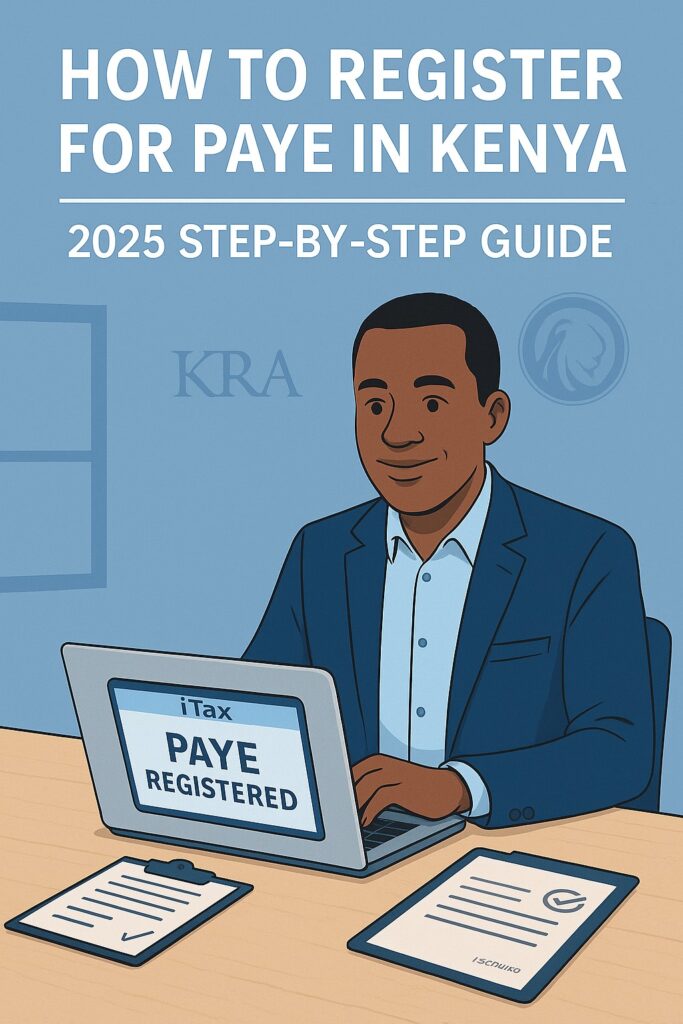📌 Introduction
If you’ve hired employees in Kenya — even just one — then you’re legally required to register for PAYE (Pay As You Earn) with the Kenya Revenue Authority (KRA).
In 2025, non-compliance with PAYE rules attracts heavy penalties, limits access to a Tax Compliance Certificate (TCC), and can land your business in trouble.
In this guide, we break down:
- When PAYE registration is mandatory
- How to register on iTax (step-by-step)
- What happens after registration (e.g., filing obligations)
- Common mistakes to avoid and tips to stay compliant
🧾 What is PAYE?
PAYE (Pay As You Earn) is a system where employers deduct income tax from their employees’ monthly salaries and remit it to KRA.
It applies to employment income exceeding the monthly tax-free threshold (currently Ksh 24,000).
Employers act as withholding agents under the Income Tax Act (Cap 470).
✅ Who Must Register for PAYE?
Any Kenyan business or organization that:
- Employs at least one staff member
- Pays employees above the minimum taxable income
- Includes salary, wages, bonuses, commissions, benefits, or housing
🧭 How to Register for PAYE on iTax (2025)
Step-by-Step Guide:
🪜 Step 1: Log into iTax
- Visit itax.kra.go.ke
- Enter your business PIN and password
🪜 Step 2: Amend PIN Details
- Go to “Registration” → “Amend PIN Details”
- Choose “Online Form”
🪜 Step 3: Add PAYE Obligation
- Under “Tax Obligation Details”, tick PAYE (Income Tax)
- Enter the effective date (usually current month)
🪜 Step 4: Submit and Download Acknowledgment
- Submit the amendment
- Download and save the acknowledgment receipt
✅ Done! You’re now registered for PAYE.
KRA will expect you to file and pay PAYE monthly, even if no salary was paid that month (file a Nil return).
🗂️ Requirements for PAYE Registration
- Active KRA PIN
- Access to iTax
- Employer details (address, business name, contacts)
- At least one employee on payroll
💡 Employer’s Monthly PAYE Obligations
| Task | Deadline |
|---|---|
| Deduct PAYE from employee salaries | By payroll date |
| File PAYE return (P10 form) | By 9th of the following month |
| Pay the tax via iTax or bank | Also by 9th |
| Issue employee P9 forms (year-end) | By 30th June annually |
| File annual return | By 30th June annually |
❌ Common Mistakes to Avoid
- ❌ Delaying registration even after hiring
- ❌ Assuming casuals or temps don’t count
- ❌ Failing to file nil returns when no salaries were paid
- ❌ Missing the 9th of the month deadline
- ❌ Not issuing employees with P9 forms in time
Tip: Automate payroll with compliance software to avoid missing deadlines.
📉 Penalties for PAYE Non-Compliance (2025)
- Late return filing: Ksh 10,000 or 25% of tax due (whichever is higher)
- Late payment: 5% penalty + 1% interest per month
- Failure to register: Treated as tax evasion
- Non-filing blocks TCC access
🧠 FAQs
Q1: Can a sole proprietor register for PAYE?
Yes — if they have at least one employee.
Q2: Do I file PAYE if no salary was paid?
Yes — file a Nil return.
Q3: How do I get employee P9 forms?
Use your payroll software or generate from your records manually.
Q4: Can I deregister PAYE if I stop paying salaries?
Yes — submit a PIN amendment to remove PAYE as an obligation.
Q5: Must I register for PAYE if employees earn below Ksh 24,000?
No, but you must keep payroll records and confirm exemption in returns.
📣 Conclusion: Get PAYE Right From the Start
Whether you’re a startup or established SME, registering for PAYE is not optional once you hire.
It’s quick to register, but penalties for failing to comply can be brutal.
✅ Do it early
✅ File monthly
✅ Stay on top of your payroll taxes
👉 Need help filing PAYE or automating your payroll tax compliance?
Visit Ushuru.com or download our FREE Employer PAYE Checklist.


Am trying to add a PAYE Obligation and once i choose the obligation am getting an error stating “Please choose file to upload” . What does it mean?
It means you’re required to upload supporting documents to support your obligation request.
1. Formal letter requesting addition of PAYE obligation.
2. Sample Payroll (latest)
3. Sample employment contract
How long does the approval process take after uploading the mentioned documents above?
The approval process shouldn’t take long. 3 -5 working days. It can take shorter time, however you’ll need to follow up with your Tax station to identify the cause for delay.